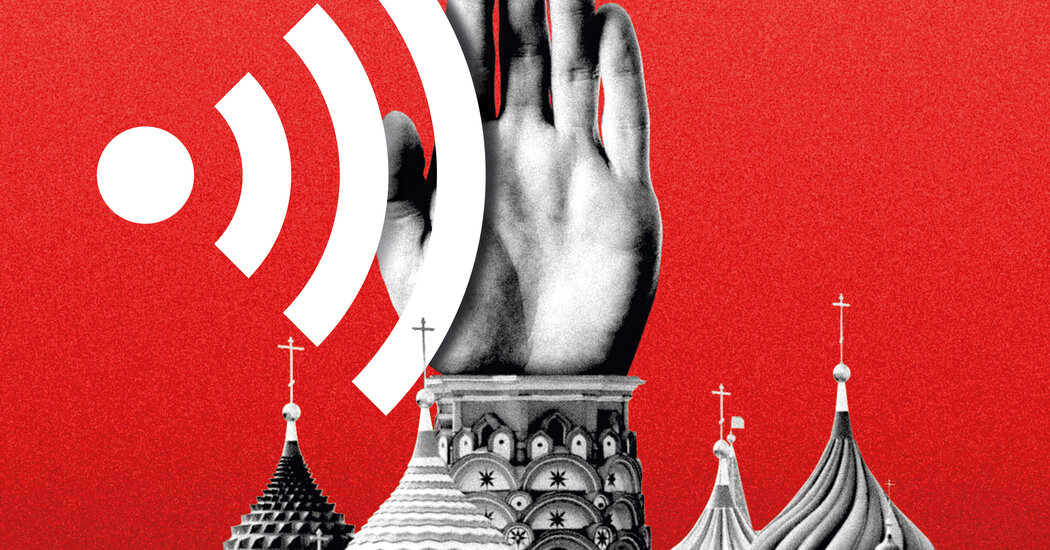
LONDON — Russia is increasingly pressuring Google, Twitter and Facebook to fall in line with Kremlin internet crackdown orders or risk restrictions inside the country, as more governments around the world challenge the companies’ principles on online freedom.
Russia’s internet regulator, Roskomnadzor, recently ramped up its demands for the Silicon Valley companies to remove online content that it deems illegal or restore pro-Kremlin material that had been blocked. The warnings have come at least weekly since services from Facebook, Twitter and Google were used as tools for anti-Kremlin protests in January. If the companies do not comply, the regulator has said, they face fines or access to their products may be throttled.
The latest clashes flared up this week, when Roskomnadzor told Google on Monday to block thousands of unspecified pieces of illegal content or it would slow access to the company’s services. On Tuesday, a Russian court fined Google 6 million rubles, or about $81,000, for not taking down another piece of content.
On Wednesday, the government ordered Facebook and Twitter to store all data on Russian users within the country by July 1 or face fines. In March, the authorities had made it harder for people to see and send posts on Twitter after the company did not take down content that the government considered illegal. Twitter has since removed roughly 6,000 posts to comply with the orders, according to Roskomnadzor. The regulator has threatened similar penalties against Facebook.
Russia’s campaign is part of a wave of actions by governments worldwide to test how far they can go to censor the web to maintain power and stifle dissent. On Monday, the police visited Twitter’s offices in New Delhi in a show of force. No employees were present, but India’s governing party has become increasingly upset with the perception that Twitter has sided with its critics during the coronavirus pandemic.
In Myanmar, Poland, Turkey and elsewhere, leaders are also tightening internet controls. In Belarus, President Aleksandr G. Lukashenko this week signed a law banning livestreams from unauthorized protests.
“All of these policies will have the effect of creating a fractured internet, where people have different access to different content,” said Jillian York, an internet censorship expert with the Electronic Frontier Foundation in Berlin.
The struggle over online speech in Russia has important ramifications because the internet companies have been seen as shields from government censors. The latest actions are a major shift in the country, where the internet, unlike television, had largely remained open despite President Vladimir V. Putin’s tight grip on society.
That has changed as Russians have increasingly used the online platforms to speak out against Mr. Putin and to organize and share information. Russian officials, taking a cue from China’s Great Firewall, have pledged to build a “sovereign internet,” a legal and technical system to block access to certain websites and fence off parts of the Russian internet from the rest of the world.
“What is happening in Russia foreshadows an emerging global trend when censorship becomes but one tool in the ultimate battle for writing the rules that major tech platforms have to follow,” said Sergey Sanovich, a Princeton University researcher focused on internet censorship and social media governance.
Roskomnadzor did not immediately respond to a request for comment. In an interview this week with Kommersant, a leading Russian newspaper, Andrey Lipov, the head of Roskomnadzor, said slowing down access to internet services was a way to force the companies to comply with Russian laws and takedown orders. Mr. Lipov said blocking their services altogether was not the goal.
Google declined to discuss the situation in Russia and said it received government requests from the around the world, which it discloses in its transparency reports.
Facebook also would not discuss Russia, but said it generally restricted content that violated local laws or its terms of service. “We always strive to preserve voice for the greatest number of people,” a spokeswoman said.
Twitter said in a statement that it took down content flagged by the Russian authorities that violated its policies or local laws.
“Access to a free and open internet is an essential right for all citizens,” Twitter said. “We remain deeply committed to offering a safe service to account holders around the world — including those in Russia.”
Anastasiia Zlobina, a researcher for Human Rights Watch who focuses on Russian internet censorship, said the government crackdown threatened the future of American internet services in the country. A turning point, she said, was when YouTube, Facebook and Twitter were used during protests in support of the opposition leader Alexei A. Navalny after his arrest in January. The demonstrations were the biggest shows of dissent against Mr. Putin in years.
“This mobilization was happening online,” Ms. Zlobina said.
The Russian government has portrayed the tech industry as part of a foreign campaign to meddle in domestic affairs. The authorities have accused the companies of blocking pro-Kremlin online accounts while boosting the opposition, and said the platforms were also havens for child pornography and drug sales.
Twitter became the first major test of Russia’s censorship technology in March when access to its service was slowed down, according to researchers at the University of Michigan.
To resolve the conflict, a Twitter executive met at least twice with Russian officials, according to the company and Roskomnadzor. The government, which had threatened to ban Twitter entirely, said the company had eventually complied with 91 percent of its takedown requests.
Other internet companies have also been affected. Last month, TikTok, the popular social media platform owned by the Chinese company ByteDance, was fined 2.6 million rubles, or about $35,000, for not removing posts seen as encouraging minors to participate in illegal demonstrations. TikTok did not respond to a request for comment.
The fines are small, but larger penalties loom. The Russian government can increase fines to as much as 10 percent of a company’s revenue for repeat offenses, and, perhaps more important, authorities can disrupt their services.
Perhaps the biggest target has been Google. YouTube has been a key outlet for government critics such as Mr. Navalny to share information and organize. Unlike Facebook and Twitter, Google has employees in Russia. (The company would not say how many.)
In addition to this week’s warning, Russia has demanded that Google lift restrictions that limit the availability of some content from state media outlets like Sputnik and Russia Today outside Russia.
Russia’s antitrust regulator is also investigating Google over YouTube’s policies for blocking videos.
Google is trying to use the courts to fight some actions by the Russian government. Last month, it sued Roskomnadzor to fight an order to remove 12 YouTube videos related to opposition protests. In another case, the company appealed a ruling ordering YouTube to reinstate videos from Tsargrad, a nationalist online TV channel, which Google had taken down over what it said were violations of American sanctions.
Joanna Szymanska, a senior program officer for Article 19, an internet freedom group, said Google’s recent lawsuit to fight the YouTube takedown orders would influence what other countries did in the future, even if the company was likely to lose in court. Ms. Szymanska, who is based in Poland, called on the tech companies to be more transparent about what content they were being asked to delete, and what orders they were complying with.
“The Russian example will be used elsewhere if it works well,” she said.
Adam Satariano reported from London, and Oleg Matsnev from Moscow. Anton Troianovski contributed reporting from Moscow.




